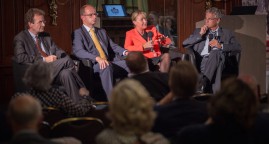“Inaction is sometimes more costly than action.”
Since the Arab Spring the situation of the Muslim world is experiencing a bloody evolution. The Syrian desert has become a battlefield between Sunnites and Shiites, the proponents of moderate Islam and fundamentalists.
Instability in the region has led to the deaths of nearly 250,000 people and to the displacement of nearly 4 million refugees.How can the internationalization of an initially local conflict be explained? Does the European Union, which is directly concerned by the terrorist threat from this region, have a role to play in the political process? If so, in what way?
Interview and response elements with Jean-Pierre Filiu, professor at Sciences Po (Paris), also teacher at the universities of Columbia (New York) and Georgetown (Washington). He recently published “The Arab Revolution, ten lessons on the democratic uprising” by Fayard.
Read the full article on the Robert Schuman Fundation website
Related Articles
Migration: Order of Malta at the Marrakech Summit to Adopt the Global Compact
12/10/2018. Grand Chancellor: “An important milestone for the international community”
Pope Francis addresses Judges’ summit on human trafficking and organized crime
06/03/2016. The Holy Father asked them “to fulfill their vocation and their crucial mission without which there is neither order nor sustainable and integral development, nor social peace”.
Order of Malta Germany organises acutely topical conference on migration
09/18//2015. What is the future of migration and our social responsibility? How can we achieve successful integration in the long-term?





